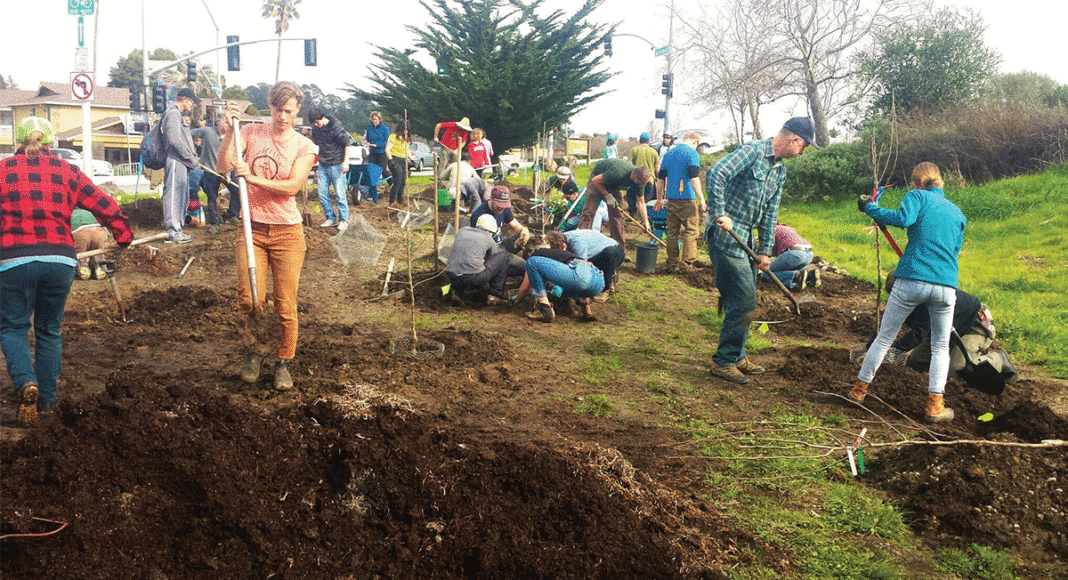On a recent Saturday, local volunteers dug plots for a public orchard in Mike Fox Park, just off Riverside Avenue. The project is being spearheaded by the Santa Cruz Fruit Tree Project (SCFTP), the organization that led the charge to install 12 trees inside Riverside Gardens Park years ago.
The new dig began with a modest 17 people, but grew quickly. Some volunteers came with thick gardening gloves, others brought their own shovels and wheelbarrows. Within the hour, more than 50 people were busy building gopher baskets and digging plots for saplings.
“We’re hoping that over the years, people from the community will come and learn to tend the orchard and take pride and ownership in the project,” says Debora Wade, one of the committee leaders for the project.
Wade and others also hope the orchard and garden will bear fruit to feed the public, saying vacant pieces of land can be better utilized as community gardens than plots for topiary plants. The new project is a result of the SCFTP’s previous success with the Riverside Gardens Park orchard. Organizers worked with city officials to expand the idea, leading to the plan for Mike Fox Park.
Efforts to cultivate community gardens in Santa Cruz are in step with decades of community garden growth across the nation. Los Angeles County boasts more than 125 gardens within its borders, and New York City’s five boroughs have more than 600 gardens. Officially, the city of Santa Cruz manages five gardens, according to the Parks Master Plan for 2030.
Residents digging the plots at the new orchard say they were drawn by the idea of community united around shared green spaces. Robert Markstein, a 60-year-old downtown Santa Cruz resident, admits he’s a terrible gardener, despite having several fruit trees in his own backyard. He credits the rich soil in Santa Cruz for whatever success he’s had, recalling an era when the city was more orchards than dense housing.
“If we live in an area where the soil is so fertile that all you have to do is plant trees and they’ll grow, then why are we not doing that so everyone can have access to food?” asks Markstein.
But the push for community garden spaces has had its setbacks, as well. The Beach Flats Community Garden, a stone’s throw away from the new orchard, has been at the center of controversy in recent years. In 2015, the Seaside Company, which owns the land, opted not to renew the city’s lease on the plot of land. That prompted outrage from residents, which pushed the Seaside Company to preserve 60 percent of the garden through a three-year lease. It left the door open for the company and the city to discuss and negotiate the garden’s future.
In a discussion of the Parks Master Plan on Feb. 7, Santa Cruz City Manager Martín Bernal said the city would discuss keeping the garden on the existing site permanently. Officials are also surveying the neighborhood for alternative sites.
Seaside Spokesperson Kris Reyes said there were no current negotiations happening but reiterated the company’s commitment to working with the city.
“As you may recall, the city has committed to finding a permanent solution to this issue, and we look forward to hearing from them regarding their ideas on how to achieve this goal in the future,” Reyes said in an email.
The city’s search for a solution to the Beach Flats dispute reflects the growing sense that it’s amenable to greener practices. Drew Glover, founder and director of the organization Project Pollinate, said the city recognizes and is beginning to support organic gardening and food justice.
But Glover points out that the community garden spaces aren’t limited to efforts from the city. Project Pollinate is partnering with community organizations to create pollinator gardens for bees, monarch butterflies and other animals.
Beyond benefitting the animals, the gardens are spaces for residents to learn about best gardening practices and for marginalized communities to access organic produce, Glover said.
“I hope the city makes it a point in the Parks Master Plan to incorporate language and plans to direct city planners to implement large plots of land as organic gardens and orchards,” Glover says.












